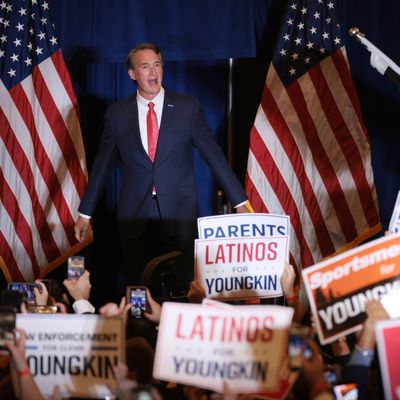
From one perspective, the immediate future looks rosy for the Republican Party. Thanks to some crucial underperformances by House Democrats in 2020, even a very mild version of the usual anti–White House–party midterm wave (with another thumb on the scales from its redistricting advantage) will flip the House and end the Democratic governing trifecta. No more $2 trillion reconciliation bills — nor even the routine legislation Democrats could enact if they talked Joe Manchin and Kyrsten Sinema into supporting filibuster reform — will be in order. And even if they fall short of winning the Senate next year, the 2024 Senate landscape looks very good for the GOP.
That’s the macro perspective. From the micro perspective, particularly when it comes to the statewide Senate and gubernatorial elections of 2022, things will be trickier for the Elephant Party. The difficulty of winning races that cannot be won simply by riding a wave will be complicated significantly by the Trump factor. To the extent he interferes in both GOP primaries and general-election campaigns, he creates the triple specter of intraparty divisions, swing-voter focus on Trump rather than Biden, and Democratic voter enthusiasm over another chance to smite the the 45th president.
It’s not a problem that Republicans can dismiss. Trump has already endorsed five Senate candidates in contested primaries, seven gubernatorial candidates in contested primaries, and eight statewide down-ballot candidates in contested primaries. And it’s very early in the midterm cycle.
The possibility of a divided and distracted party losing races it otherwise might not thanks to the former president’s disruptive presence is actually underlined by the big star of 2021, Virginia governor-elect Glenn Youngkin. He is universally thought to have threaded the needle by staying friendly enough with Trump to avoid his malice during the nominating process and the general election while keeping him at arm’s length, even as Democrat Terry McAuliffe incessantly tried to make Youngkin out to be Trump’s puppet or alter ego. But it’s not an act that is going to be easy for others to repeat.
Aside from Youngkin’s personal qualities (including immense wealth and the absence of any record in public office to defend), he got to the general election via a unique nominating process that helped him build an intraparty consensus without taking positions that would compromise his viability with the broader electorate. As George Mason University professor Mark Rozell observed, Virginia Republicans chose a convention (albeit an “unassembled” convention of self-selected delegates voting at disparate places) rather than a primary to avoid any right-wing populist upsurge, but then added the wrinkle of ranked-choice voting to ensure that the nominee eventually secured majority support:
Tired of watching every Republican claim to elective power in Virginia vanish while Donald Trump was either on the ballot or in the White House, GOP convention delegates in more than three dozen locations avoided a nominee in the image of the widely disliked former president. Instead, they picked an easygoing, unknown investment executive somewhat independent of Trump.
In other words, Youngkin’s candidacy was the product of an elite consensus that might never have emerged from a primary, particularly under a plurality system where a Trumpian extremist (e.g., Virginia state legislator Amanda Chase, who called herself “Trump in heels” and whose dangerous candidacy was thought to have inspired the GOP’s unusual nominating process in 2021) would be hard to beat. It’s not at all clear it can be replicated in 2022 outside (or even inside) Virginia.
Already Republicans are taking Youngkin’s name in vain, citing his example on behalf of very problematic candidacies. Former U.S. House Speaker Newt Gingrich, for example, called on former U.S. Senator David Perdue (whom Trump has also been begging to run) to launch a primary challenge to incumbent Georgia governor Brian Kemp. Why? Gingrich explained:
The closest parallel Georgia has to Glenn Youngkin is David Perdue. Like Youngkin, Perdue has had a long career as a business executive and a job creator. Like Youngkin, Perdue’s natural instinct is to solve problems and bring people together. Like Youngkin, Perdue can bring together the Trump base and those Republicans, independents, and moderate Democrats who will find [likely Democratic gubernatorial candidate Stacey] Abrams too radical.
Suffice it to say that recruiting a candidate to purge a sitting Republican governor on the orders of Donald Trump has little to do with the example set by Youngkin. But Gingrich will not be alone in trying to appropriate the Virginian’s success. Republicans cannot just conjure up perfect candidates, guarantee them nominations and then expect them to somehow maintain an ideal balance between Trumpiness and independence. Nor is there any guarantee that cookie-cutter campaigns based on issues that worked in Virginia in November of 2021 are going to be effective a year later in different locales.
Above all, Republicans have not solved the problem of how to manage their unmanageable former president, who is determined to make the midterms a vindication of his many grudges and a springboard to a potentially terrifying restoration in 2024. Their current triumphalism is emphatically premature.






























